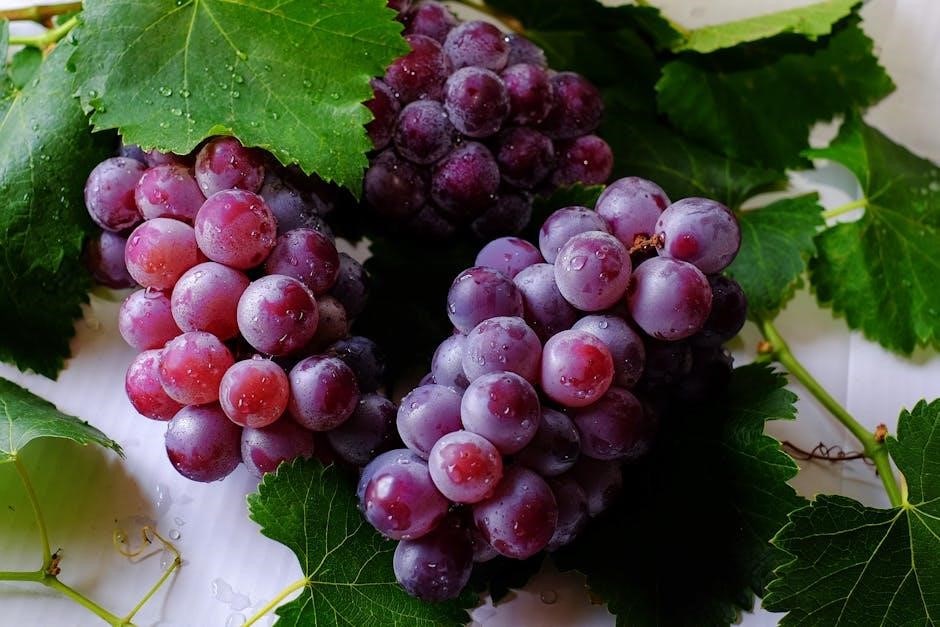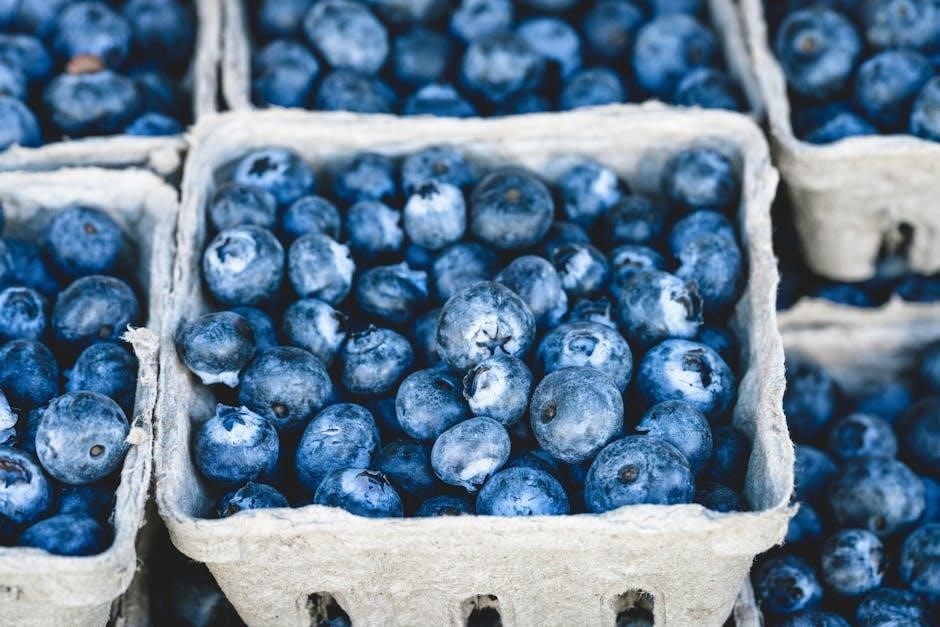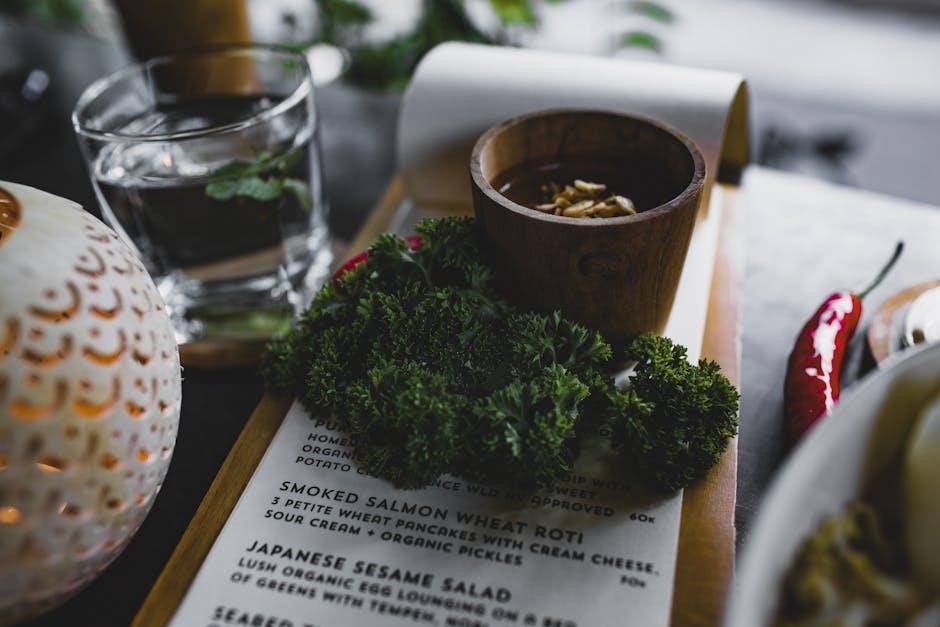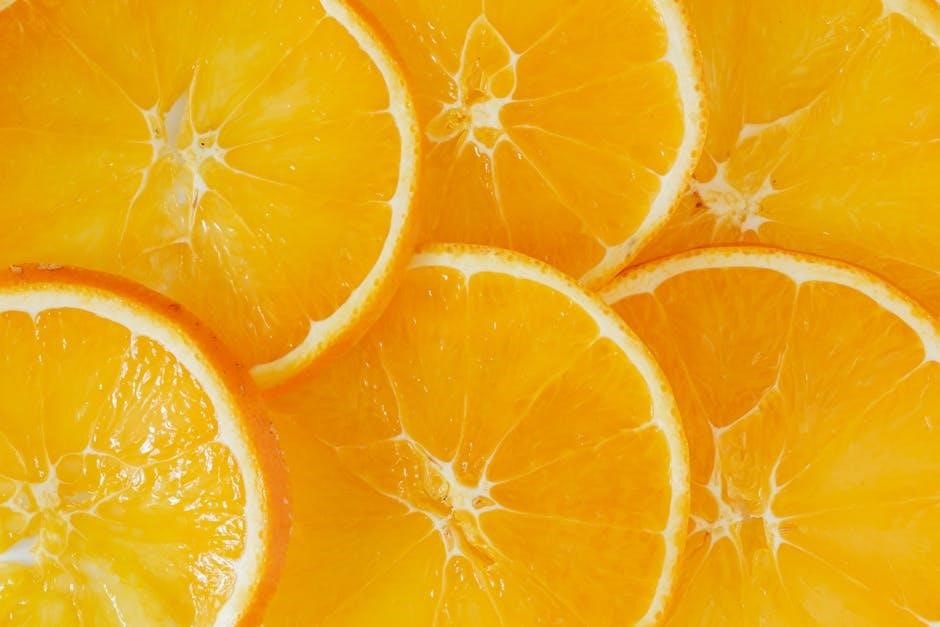A vegan diet focuses on plant-based foods, excluding animal products, emphasizing natural ingredients for health and sustainability. It offers a variety of flavors and nutrients for a balanced lifestyle.
What is a Vegan Diet?
A vegan diet is a plant-based eating pattern that excludes all animal products, including meat, dairy, eggs, and honey. It focuses on whole, minimally processed foods like fruits, vegetables, grains, legumes, nuts, and seeds. This diet emphasizes natural ingredients, promoting health and sustainability while avoiding animal-derived items. Vegans often choose this lifestyle for ethical, environmental, or health reasons, embracing a variety of flavors and nutrients from plant sources. By centering meals around whole foods, a vegan diet offers a balanced and nutritious approach to eating.
Benefits of a Vegan Diet
A vegan diet offers numerous health, environmental, and ethical benefits. It promotes weight management, lowers cholesterol, and reduces the risk of chronic diseases like heart disease and diabetes. Plant-based eating supports gut health through fermented foods and fiber-rich options. Environmentally, it reduces greenhouse gases and water usage associated with animal agriculture. Ethically, it advocates for animal welfare and sustainable living. By focusing on whole, nutrient-dense foods, a vegan diet fosters overall well-being and aligns with eco-conscious values, making it a holistic choice for health and the planet.
Importance of a Vegan Grocery List

Importance of a Vegan Grocery List
A vegan grocery list helps organize shopping, ensures essential items are purchased, and prevents overspending. It simplifies meal planning and guarantees a well-stocked pantry for a plant-based diet.
Why You Need a Vegan Grocery List
A vegan grocery list is essential for staying organized and ensuring you purchase all necessary plant-based items. It helps avoid impulse buys, reduces food waste, and guarantees a balanced diet. By planning meals in advance, you can efficiently shop for whole foods, nuts, seeds, and fresh produce, ensuring you cover all nutritional needs. This list also aids in budgeting and helps you avoid non-vegan products, making grocery shopping simpler and more effective for maintaining a healthy, sustainable lifestyle. It serves as a practical guide for both new and experienced vegans.
How to Use a Vegan Grocery List Effectively
Using a vegan grocery list effectively starts with meal planning to avoid unnecessary purchases. Categorize items like produce, grains, and proteins for easier shopping. Check expiration dates and stock levels at home to minimize waste. Use checkboxes or highlight items as you shop to stay organized. Carry the list on your phone or print it for convenience. This approach ensures you cover all nutritional needs, stick to your budget, and enjoy a streamlined shopping experience tailored to your plant-based lifestyle.

Whole Foods in a Vegan Diet
Whole foods form the foundation of a balanced vegan diet, offering essential nutrients, fiber, and health benefits. They include fruits, vegetables, grains, legumes, nuts, and seeds in their natural form, promoting well-being and sustainability.
Grains
Grains are a cornerstone of a balanced vegan diet, providing complex carbohydrates, fiber, and essential nutrients like iron, B vitamins, and magnesium. Popular whole grains include brown rice, quinoa, oats, and whole wheat, while options like barley and farro add variety to meals. Grains serve as a versatile base for dishes, from stir-fries to salads, and are excellent for sustained energy. Incorporating whole grains supports digestive health and helps maintain a feeling of fullness, making them a key component of plant-based eating and a great addition to your vegan grocery list.
Legumes
Legumes are a vital protein source in a vegan diet, offering high amounts of fiber, vitamins, and minerals. Common varieties include lentils, chickpeas, black beans, and kidney beans. They are versatile, featured in dishes from hummus to chili, and provide essential nutrients like iron and zinc. Legumes are cost-effective and can be easily incorporated into meals, making them a cornerstone of plant-based eating and a must-have on your vegan grocery list for a nutritious and balanced lifestyle.
Nuts and Seeds
Nuts and seeds are calorie-dense, offering healthy fats, protein, and essential micronutrients. Almonds, walnuts, chia seeds, and flaxseeds are popular choices, providing omega-3 fatty acids and fiber. They add texture to dishes and serve as versatile snacks or toppings. Opt for unsalted, unsweetened varieties to avoid added sugars and sodium. Incorporate them into meals for energy and nutrition, but consume in moderation due to their high calorie content. They are a valuable addition to your vegan grocery list for enhancing flavor and nutritional balance.
Fruits and Vegetables
Fresh fruits and vegetables are the foundation of a healthy vegan diet, offering essential vitamins, minerals, and antioxidants. Incorporate seasonal produce for variety, flavor, and nutritional benefits in every meal.
Seasonal Fruits
Incorporating seasonal fruits into your vegan diet ensures freshness, variety, and optimal nutrition. Enjoy bananas, apples, and berries in cooler months, while tropical options like papaya and kiwi shine in warmer seasons. These fruits are rich in vitamins, minerals, and antioxidants, supporting overall health. Using a vegan food list PDF, you can easily track and plan meals around what’s in season, ensuring your diet remains vibrant and flavorful year-round. Seasonal produce also tends to be more affordable and sustainable, making it a win for both your health and the planet.
Leafy Greens
Leafy greens are a cornerstone of a healthy vegan diet, offering a wealth of vitamins, minerals, and antioxidants. Kale, spinach, and broccoli are staples, while arugula and collard greens add variety. These greens support digestion, boost energy, and promote overall well-being. Incorporate them into salads, smoothies, or sautéed dishes for a nutrient-packed meal. A vegan food list PDF often highlights these superfoods, making it easier to plan meals. Rotate types to maximize benefits and keep your diet diverse and flavorful. Leafy greens truly are a simple yet powerful way to enhance your plant-based eating journey.
Convenience Foods
Convenience foods like frozen meals and prepared vegan options save time and simplify meal prep. They are perfect for busy lifestyles while maintaining a balanced, plant-based diet.
Frozen Foods
Frozen foods are a convenient and nutritious addition to a vegan diet. They include a variety of options such as fruits, vegetables, and prepared meals like veggie burgers and plant-based pizzas. These items are often flash-frozen to preserve nutrients and can be just as healthy as fresh alternatives. Many frozen foods are also affordable and have a longer shelf life, making them a practical choice for meal planning. Additionally, brands like Gardein and MorningStar Farms offer a range of vegan frozen products that are both tasty and easy to prepare.
Prepared Foods
Prepared foods offer convenience for vegan meal planning, including items like veggie burgers, plant-based pizzas, and meat substitutes. These options are perfect for busy days and can be easily incorporated into meals. However, many prepared foods are highly refined and may contain added fats or salts. They are great for transitioning to a vegan diet but should be consumed in moderation. Always check labels to ensure alignment with your dietary preferences and health goals. These foods provide versatility and ease, making them a valuable addition to your vegan grocery list.
Spices and Herbs
Spices and herbs add flavor and depth to vegan meals without animal products. Common options include cumin, turmeric, basil, and oregano; Fresh herbs like parsley and cilantro enhance dishes naturally, while spices like paprika and chili powder provide vibrant flavors. They also offer health benefits, such as aiding digestion and boosting immunity. Incorporating these into your vegan diet ensures meals are both nutritious and delicious, making them a must-have in your pantry for everyday cooking.
Essential Spices
Essential spices are the backbone of a vegan kitchen, adding flavor and depth to plant-based dishes. Common must-haves include cumin, turmeric, paprika, garlic powder, onion powder, and black pepper. These spices enhance the natural taste of ingredients and are versatile for various cuisines. Turmeric, for instance, offers anti-inflammatory properties, while cumin aids digestion. Chili flakes or cayenne pepper add a spicy kick, perfect for vibrant meals. Incorporating these spices ensures your vegan recipes are both nutritious and flavorful, making them indispensable in your pantry for everyday cooking.
Fresh Herbs
Fresh herbs like basil, cilantro, parsley, and mint add vibrant flavors to vegan dishes. They enhance salads, smoothies, and sauces, providing a burst of freshness. Many herbs are rich in antioxidants and vitamins, boosting both health and taste. Cilantro pairs well with Mexican dishes, while basil complements Mediterranean recipes. Using fresh herbs not only elevates meals but also supports gut health and digestion. Incorporating them into your vegan diet ensures your meals are both nutritious and delicious, making them a must-have in your kitchen for everyday cooking.

Fermented Foods
Fermented foods like kimchi and sauerkraut are rich in probiotics, supporting gut health and digestion. They add tangy flavors to dishes, making them a great addition to a vegan diet.
Kimchi
Kimchi, a traditional Korean fermented dish, is a staple in many vegan diets. Made from cabbage, vegetables, and spices, it is rich in probiotics, enhancing gut health. Its tangy flavor adds depth to meals, making it a versatile condiment. Kimchi is high in vitamins and antioxidants, supporting immune function. It is easy to incorporate into salads, soups, or served as a side. Look for vegan-friendly versions without animal-derived ingredients. Including kimchi in your diet promotes digestion and offers a burst of flavorful nutrition, making it a great addition to your plant-based lifestyle.
Sauerkraut
Sauerkraut, a fermented cabbage dish, is a nutritious addition to a vegan diet. Rich in probiotics, it supports gut health and boosts the immune system. Made from shredded cabbage fermented in its own juice, sauerkraut is low in calories and high in vitamins C and K. It adds a tangy flavor to salads, sandwiches, and soups. Look for unflavored, unsweetened varieties to avoid added sugars. Sauerkraut is a versatile and healthy condiment that enhances both taste and nutrition, making it a great choice for plant-based eating.

Downloadable Vegan Food List PDF
Access a free, printable vegan food list PDF, perfect for meal planning and grocery shopping. Organized by categories, it ensures you never miss essential plant-based items.
How to Download
Downloading the vegan food list PDF is simple! Visit a reputable website offering the list, locate the download link, and click to save the file. Ensure you have a PDF reader installed. Many lists come with checkboxes for easy grocery planning. Some sites may require an email signup for access. Once downloaded, print the list or save it to your device for convenience. This handy resource helps you stay organized and inspired for plant-based shopping and meal prep. Download yours today and start your vegan journey with confidence!
Using the PDF List
Using the vegan food list PDF is straightforward! Print the list or save it to your device for easy access. Use the checkboxes to mark items as you shop, ensuring nothing is missed. Organize your shopping by categories like produce, grains, and legumes for efficiency. The list serves as a handy guide for meal planning and grocery trips. Refer to it regularly to stay inspired and ensure a well-stocked, plant-based pantry. It’s a practical tool to simplify your vegan journey and keep your diet balanced and delicious.
